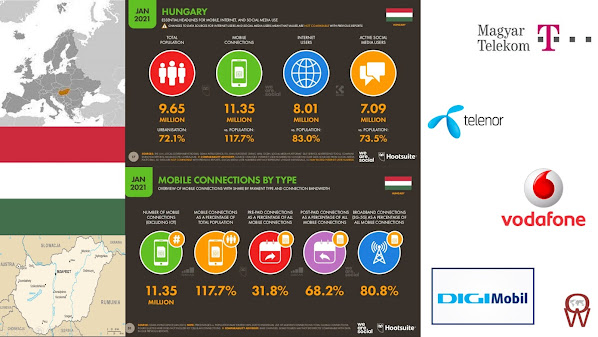
Telecommunication companies in Hungary
Hungary has a well-established telecommunications sector that plays a vital role in its economy, connecting millions of citizens and supporting the country’s digital growth. The main players in Hungary’s telecom market include both domestic and international companies, providing a range of services such as mobile, fixed-line, broadband, and digital TV services. This overview will cover the leading telecom companies operating in Hungary, their services, and the overall market dynamics.
1. Magyar Telekom
Magyar Telekom is the largest telecommunications company in Hungary and a subsidiary of Deutsche Telekom, one of the world’s leading integrated telecommunications companies. Founded in 1991, Magyar Telekom has grown into the country’s dominant telecom provider, offering a range of services including mobile, fixed-line, broadband internet, and television.
The company’s mobile network operates under the brand name T-Mobile, which provides reliable coverage across Hungary, including 4G and 5G networks. Magyar Telekom has invested heavily in expanding its fiber-optic network, covering a significant portion of households and businesses in urban and rural areas alike. The company’s “Magenta 1” packages offer bundled services, allowing customers to combine mobile, internet, and TV services for added value and convenience. As a leader in innovation, Magyar Telekom has introduced various digital services and smart solutions to the Hungarian market, such as IoT (Internet of Things) applications and smart home products.
2. Vodafone Hungary
Vodafone Hungary is another major player, part of the Vodafone Group, one of the largest telecommunications companies worldwide. Vodafone entered the Hungarian market in 1999 and quickly established itself as a strong competitor, especially in the mobile sector. The company provides a wide array of services, including mobile, internet, and business solutions, and is known for its customer-centric approach and commitment to sustainability.
Vodafone has made significant investments in its 4G and 5G networks, providing nationwide coverage and aiming to improve Hungary’s digital infrastructure. In 2019, Vodafone acquired Liberty Global’s UPC Hungary, a move that expanded its offerings to include fixed-line and broadband services. This acquisition allowed Vodafone to offer quad-play services, which bundle mobile, internet, television, and landline services. Vodafone has a strong focus on business and enterprise solutions in Hungary, supporting digital transformation for companies of all sizes.
3. Yettel Hungary
Previously known as Telenor Hungary, Yettel is a prominent telecom company that has been in the market since 1994. Originally a Norwegian company, Telenor Hungary was rebranded to Yettel in 2022 as part of a regional initiative by its owner, PPF Group, a Czech investment firm. Yettel offers a range of mobile services, including postpaid and prepaid plans, and has built a reputation for affordable packages and extensive network coverage.
Yettel has been expanding its 4G and 5G capabilities to provide faster and more reliable service for its customers. In addition to its consumer offerings, Yettel focuses on digital and mobile solutions for small and medium enterprises (SMEs), helping them adopt modern communication tools and improve efficiency. Yettel’s rebranding reflects its renewed commitment to the Hungarian market, positioning itself as a modern and innovative choice for telecommunications.
4. DIGI Hungary
DIGI Hungary, a subsidiary of Romania-based Digi Communications, has been a strong competitor in Hungary’s fixed-line and internet markets since its entry in 2008. DIGI primarily provides broadband internet, television, and landline services, focusing on offering high-speed internet and affordable TV packages. While DIGI’s presence in the mobile sector is limited, it has been expanding its infrastructure to compete more directly with larger players like Magyar Telekom and Vodafone in internet and television services.
DIGI has a solid reputation for providing value for money, and its services are especially popular among price-conscious customers. The company has rolled out fiber-optic technology in key areas, offering gigabit-speed internet in select cities and towns. DIGI’s efforts have significantly contributed to increasing competition and lowering prices in Hungary’s telecom market, especially in broadband services.
5. Telecommunication Market Trends in Hungary
Hungary’s telecommunication market is characterized by intense competition, driving continuous innovation and investments in infrastructure. The introduction of 5G technology has been a major milestone, with Magyar Telekom and Vodafone leading the way in 5G rollouts. Yettel and other companies are expected to catch up, expanding 5G availability to meet growing consumer demand for high-speed connectivity.
Broadband penetration has also been increasing steadily, thanks in part to government initiatives aimed at promoting digitalization and improving internet access in rural areas. The Hungarian government has prioritized building a digital economy and set ambitious targets for expanding high-speed internet access across the country. This supportive regulatory environment has encouraged private sector investment in fiber-optic networks and other advanced telecom infrastructure.
6. Future Outlook
Looking forward, Hungary’s telecom market is likely to see further consolidation and technological advancements. With more consumers and businesses demanding high-speed internet, 5G, and fiber-optic networks, telecom companies are expected to continue investing heavily in infrastructure. The expansion of 5G networks will open opportunities for new digital services, such as IoT, autonomous vehicles, and smart cities, enhancing the overall connectivity and digital capabilities of the Hungarian economy.
In conclusion, Hungary’s telecommunications market is vibrant and evolving, with companies like Magyar Telekom, Vodafone, Yettel, and DIGI leading the charge in offering a diverse range of services. The competition among these providers has led to better service quality, affordable pricing, and increased connectivity across the country. As Hungary continues to modernize its digital infrastructure, the telecommunication sector will play a central role in fostering economic growth and digital transformation.






Leave a Reply